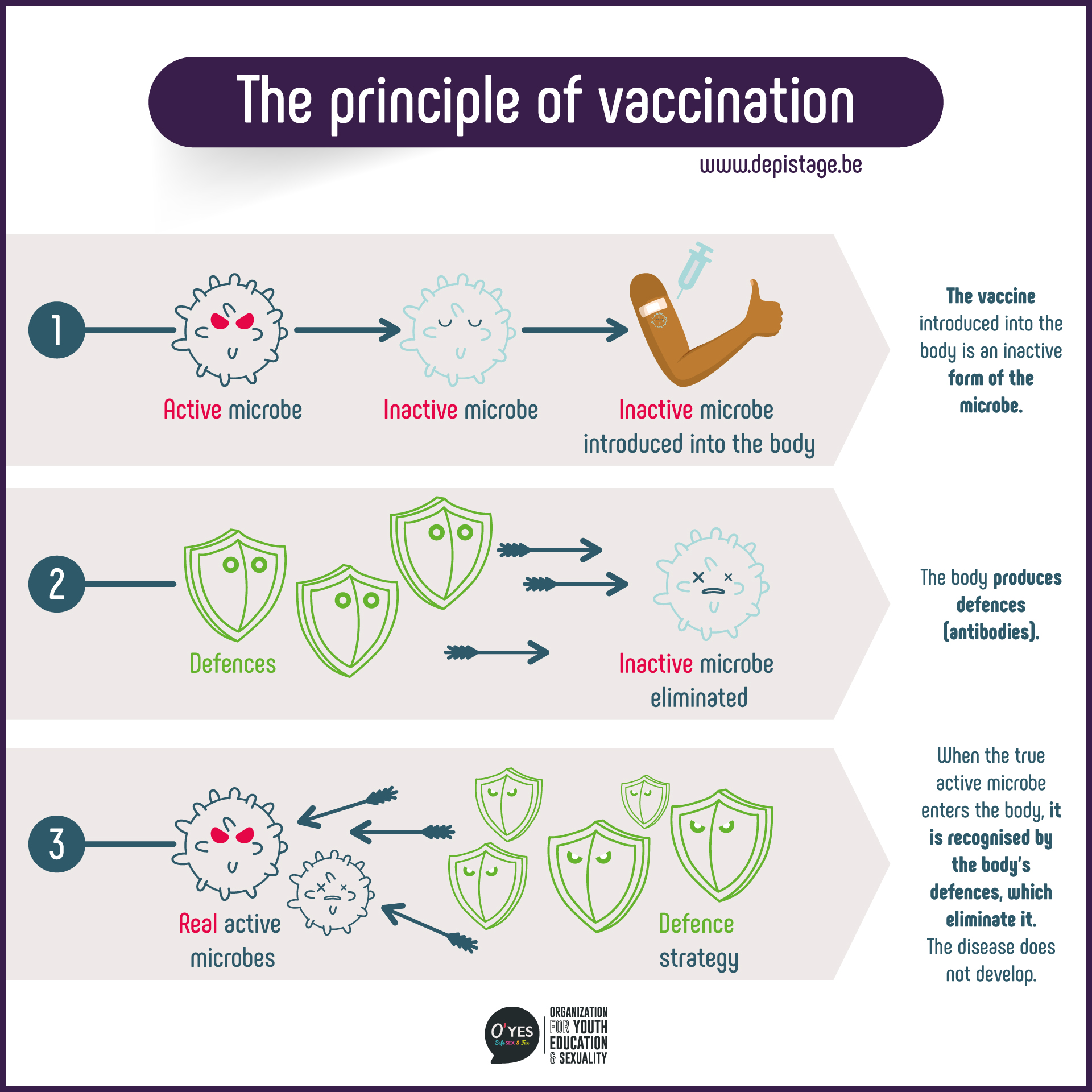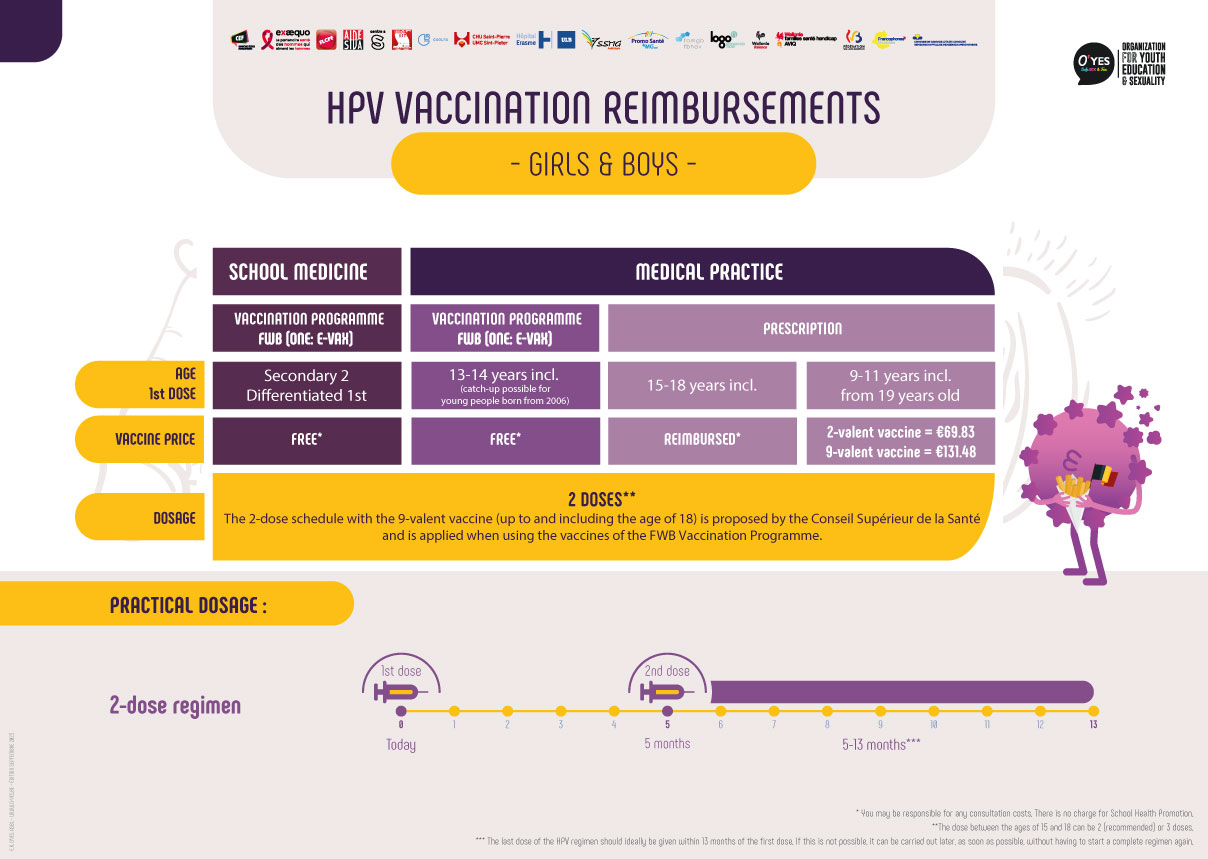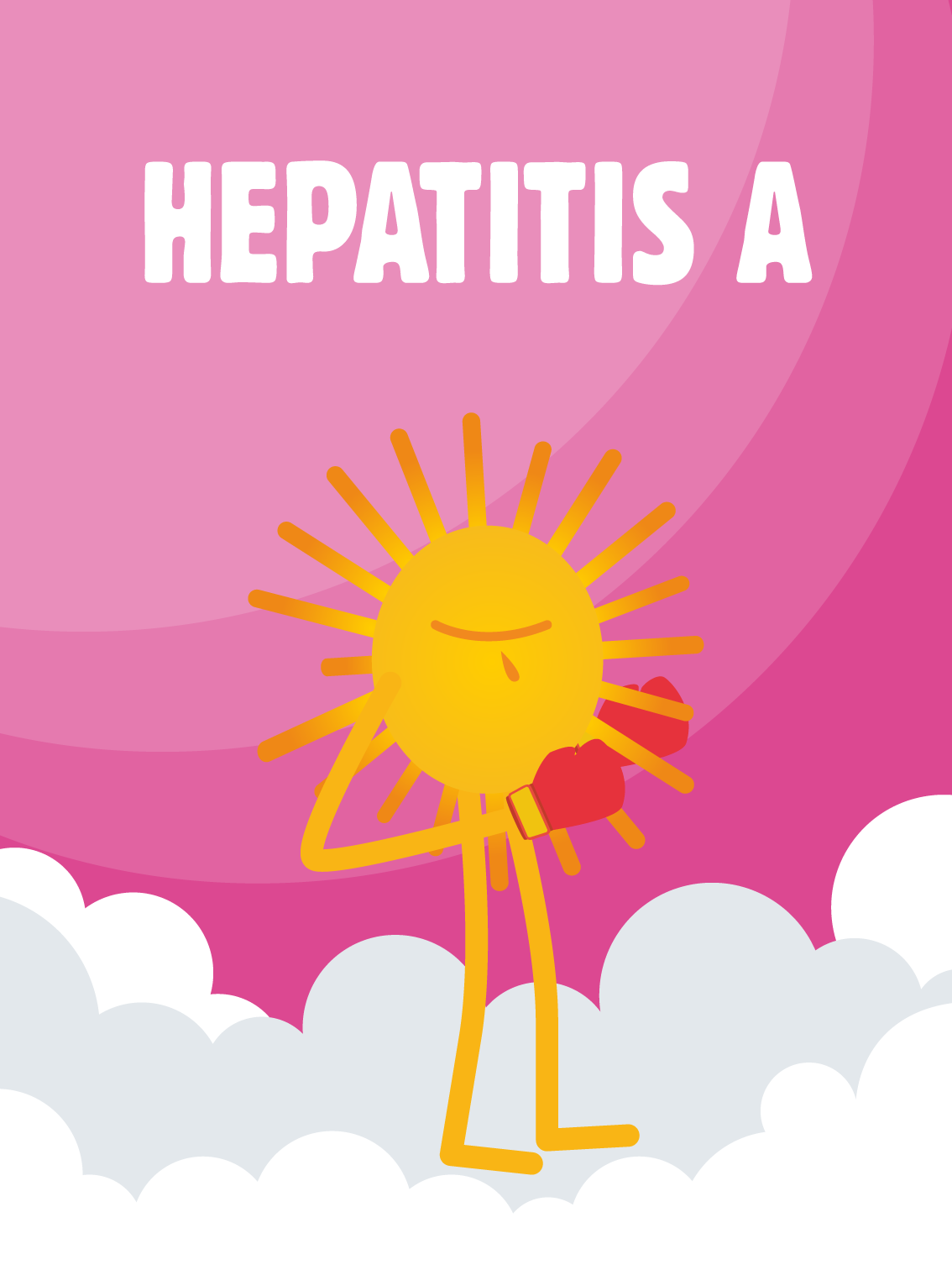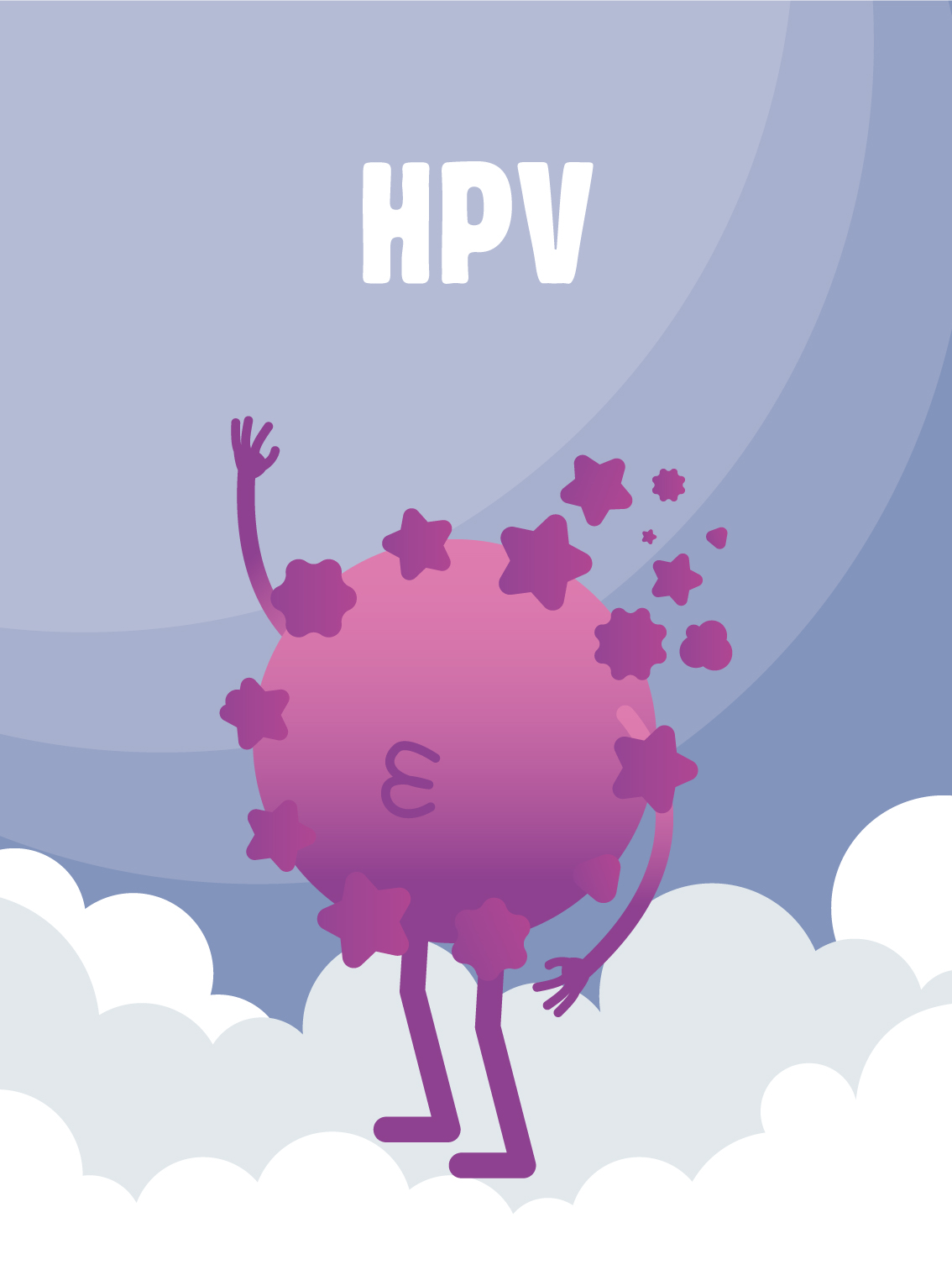Vaccination
Vaccination prepares our immune system for infection by exposing it to the antigens of a bacterium or virus. These antigens are registered as foreign components in the body, and in the event of infection, the body will be ready and will directly identify these viruses/bacteria as undesirable elements to be eliminated.
As far as STIs are concerned, there is a vaccine for hepatitis A and B and for human papillomavirus. Check your vaccination record to see if you've already had these vaccinations. If not, or if you have any doubts, you can contact a GP or go to a family planning clinic to ask any questions you may have.

Papillomavirus vaccination
In Belgium, 2 vaccines are currently available. They differ in the number of HPV types they protect against.
HPV vaccines are administered in 2 or 3 doses, depending on age, in the upper arm. The 2-dose option is proposed by the Conseil Supérieur de la Santé and applied in the use of vaccines from the Fédération Wallonie-Bruxelles vaccination program. From the age of 15, the vaccine can be administered in 2 or 3 doses. For Gardasil 9, doses are given 0, 2 and 6 months apart. For Cervarix, doses are given 0, 1 and 6 months apart. HPV vaccination is well tolerated: only slight pain, irritation at the injection site and headaches lasting a few days are sometimes reported.
The World Health Organization confirms the safety of HPV vaccines.

For whom?
The French Health Council (Conseil Supérieur de la Santé) recommends generalized vaccination of all young people between the ages of 9 and 14, and catch-up vaccination between the ages of 15 and 26 for those who have never been vaccinated. The ideal is to be vaccinated before first sexual contact. The vaccine is also recommended for people with reduced immunity (HIV-positive or organ transplant recipients) or men who have sex with men*.
*men here means people with a penis.
Free for whom?
As part of the Wallonia-Brussels Federation's vaccination calendar, the vaccine is free for anyone, regardless of gender, aged 13 to 14, in 1st differentiated or 2nd secondary school, via the school medical service or their doctor.
GPs can order vaccines free of charge and vaccinate patients free of charge, provided that the first dose is administered no later than the day before the 19th birthday.

Hepatitis A vaccination (vaccination-info.be, 2023)
Who should be vaccinated?
Vaccination against hepatitis A is recommended in certain cases, where there is a higher risk of exposure to the virus.
Travelers
The WHO recommends vaccination for all travellers to Asia, Oceania, Africa, Latin America, the Caribbean, Eastern Europe and the Near and Middle East. Even in Southern Europe, vaccination may be recommended in cases where hygiene conditions are uncertain, particularly if raw fish or seafood is consumed.
Professionals
Recommended for :
- Food chain workers,
- Staff in crèches, schools, nursing homes, etc,
- Clinical biology laboratory technicians,
- Those in contact with wastewater,
- Laundry staff.
Other risk groups
- People with high-risk sexual practices,
- Immunocompromised,
- People with chronic liver disease,
- Institutional residents,
- Persons in contact with a hepatitis A patient,
- Children of immigrants returning to their country of origin,
- Persons in contact with a child recently adopted from an endemic country.
Vaccination greatly reduces the risk of infection. In Belgium, around 150 cases are recorded every year, with peaks such as in 2017 during a European epidemic. Thanks to good hygiene conditions, the majority of the Belgian population has never been exposed.
How is hepatitis A vaccinated?
The hepatitis A vaccine is administered by injection, usually into the muscle, but sometimes under the skin.
- First dose: A single injection provides 100% protection for one year.
- Second dose: An additional injection 6 to 12 months later provides lifelong protection.
Even if it's been several years since the first dose, you can pick up where you left off without having to start all over again.
For travellers, it's best to get vaccinated two weeks before leaving for a high-risk area. However, even if you get vaccinated just before leaving, you'll have 70-90% protection for the first few weeks. The schedule can be completed later.
Finally, vaccination remains effective if carried out within a week of contact with a person infected by the virus.

Hepatitis B vaccination (vaccination-info.be, 2023)
Hepatitis B is one of the most dangerous infectious diseases according to the WHO. It is particularly widespread in sub-Saharan Africa, the Pacific, Asia, and parts of Eastern Europe and the Middle East. Vaccination is the most effective and economical way of protecting against this disease and preventing it from becoming chronic.
Who is concerned?**
Vaccination against hepatitis B is recommended for babies, certain at-risk groups, travelers to regions where the disease is common, and certain exposed professions.
Babies
In Belgium, since 1999, all unvaccinated babies and adolescents have been systematically vaccinated against hepatitis B.
At-risk groups
Vaccination is also recommended for :
- Those who may receive blood transfusions or blood-derived medications (such as hemophiliacs or dialysis patients),
- People waiting for or who have undergone a transplant (organ, bone marrow, liver),
- People with profound mental disabilities,
- Teenagers aged 13 to 15 not yet vaccinated,
- Family members and roommates of a person with hepatitis B,
- People with multiple sexual partners or high-risk behaviors,
- Injecting or intranasal drug users,
- Those diagnosed with a sexually transmitted infection (STI),
- People suffering from chronic liver disease or diabetes (before age 60).
Travelers
Travelers to regions where hepatitis B is common (Asia, Latin America, Africa, Eastern Europe, Near and Middle East) should consider vaccination, especially if they are planning extended stays or risky activities such as extreme sports.
Professionals
In Belgium, since 1999, vaccination has been compulsory for healthcare professionals, including laboratory staff, nurses, doctors and those working in funeral services, if they are exposed to blood or a risk of contamination. This obligation does not apply to administrative staff.

